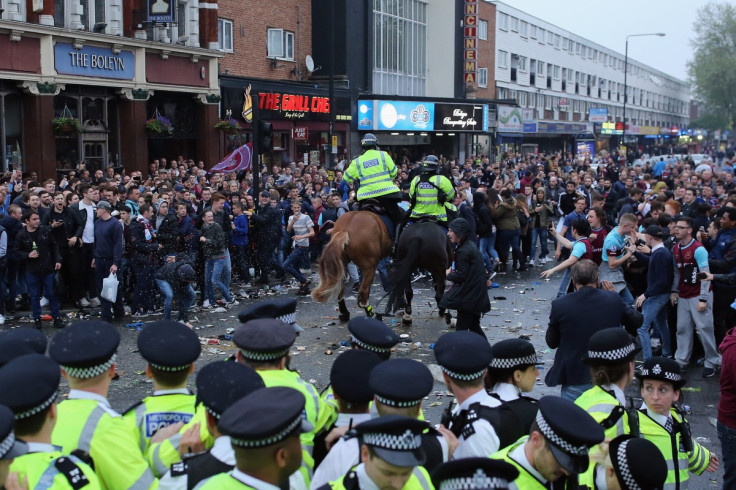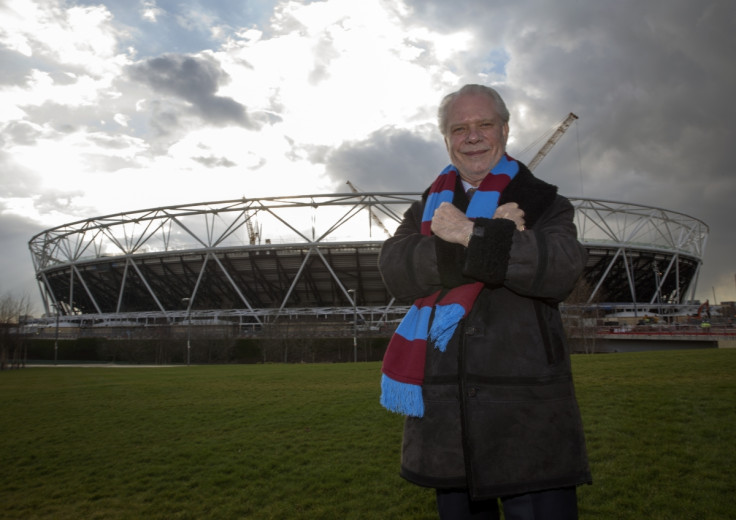West Ham fans bade farewell to Upton Park the only way they knew how

The heirs of the Inter City Firm bade farewell to Upton Park in a manner that only really made sense to them. Amidst the football, songs, and East End memories, the lasting final image of West Ham United's famous old ground will be fans throwing bottles at the Manchester United team bus, like a Guy Ritchie-directed Sealed Knot re-enactment of the 1980s.
Of course not all West Ham fans are the sort to commit random acts of violence. But the activities of the minority were not even that random. An emotional evening, a narrow street, a lot of alcohol, a bus carrying the opposition; the result shouldn't have been that hard to predict, although thoroughly depressing when it came to pass.
This, of course, was not the picture that had been painted in a thousand tributes previewing the final game at the Boleyn Ground. West Ham gave us the backbone for an England team good enough to rule the world; the elegance, creativity and goals of Bobby Moore, Martin Peters and Sir Geoff Hurst. A fine footballing culture carried through to Sir Trevor Brooking, Carlos Tevez and Dimitri Payet.
On the terraces the fans brought us the lovely lilting sound and mournful regret of I'm Forever Blowing Bubbles. But this was also a club that gave us one of the most notorious football hooligan gangs, the Inter City Firm, and its even more awful Hollywood incarnation, Green Street.
We should not overplay the role played by such fools, even back in the day, drunken fisticuffs were but a minor inconvenience, causing injuries to a few hooligans and rarely ever causing much danger to the rest of us. But it was the hooligans who gave the politicians and the police the excuse to treat the rest of the footballing community as cattle.
We have had many, many recent reminders of the awful conclusion of this treatment with the much-delayed Hillsborough verdict and the vindication of those families who fought for the honour and memory of the 96 victims whose only crime was to be football fans.
Almost ironically it was those deaths and the subsequent Taylor Report which set football along the path to becoming a multi-billion pound business rather than a national pastime. Fans moved from being cattle to consumers. Stadiums were transformed from cattle sheds to all-seater amphitheatres. Football grounds became safer and lucrative citadels. Ticket prices rose and the match day experience became sanitised. A heady combination of Gazza, Nessun Dorma and Nick Hornby convinced the nation that it was alright for non-working class people to enjoy football too and they could afford the new prices.
With the introduction of all-seater stadia the fans who congregated on the terraces on match days were no longer able to gather to sing their songs or start their fights. Many were priced out altogether, but that was okay because they became the new consumers for Rupert Murdoch's Sky TV who discovered footy fans were prepared to pay almost as much to watch the games on television as they were to attend them. It is not just football that has changed. So has Britain. Not least the East End of London, the homeland of the Hammers of Upton Park.
West Ham will join the many other teams who have left their decrepit old stadiums crammed between terraced houses for purpose-built, all-seater stadia with better transport links and less character. Roker Park was swapped for The Stadium of Light; Highbury for The Emirates Stadium; Maine Road for the Etihad Stadium. Many teams yet to move have had total makeovers. Old Trafford and its surroundings today bear little resemblance to the stadium of three decades ago.

Thus Upton Park had to be traded in for the Olympic Stadium when the opportunity arose. The club have negotiated a very good financial deal, a lovely new stadium paid for by the public and rented for a pittance. The traditional fans have not yet been priced out of supporting their team, as the club have offered very generous season ticket prices in order to fill the stadium in its first year.
If the business plan works out, then West Ham will become a genuine global player alongside Arsenal and Chelsea in the financial stakes of selling team strips, assorted merchandise and raising revenue. Ticket prices will inevitably rise alongside revenues.
West Ham fans may mourn the end of an era at the Boleyn Ground, but they are inheriting a stadium already packed with great memories, even if they are of Mo Farah and Jessica Ennis-Hill rather than Moore and Bonds. But they are just late arrivals in a transition that has seen fans become customers and football clubs become businesses. Those descendants of the ICF bottling the bus were saying a final farewell to football from another era.
© Copyright IBTimes 2025. All rights reserved.






















